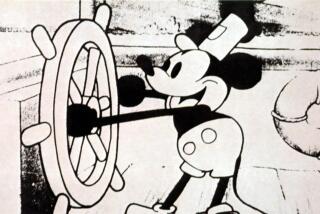Chinese Firm Helps Fight Product Knockoffs : Law: Service focuses on protecting intellectual property, a sore subject between U.S., Beijing.
BEIJING — When Mickey Mouse returned to China last year to star in a monthly Walt Disney Co. comic book, a Hong Kong private investigation team was on hand to make sure impostors didn’t steal his limelight.
IP Protect Services (China) Ltd., China’s first foreign-invested joint venture specializing in protecting intellectual property, is helping Disney take a state publishing house to court for using Mickey in a competing comic.
IP Protect was set up in July, 1993, with a staff of Chinese lawyers and retired public security officers. Maria Tam, IP Protect’s vice chairman and a former Hong Kong legislator, says the firm kept a low profile until it could “bring a tiger back to the village.”
The timing is apt. On April 30, Washington gave China 60 days to prove it was enforcing its laws against piracy of U.S. goods or face a six- to nine-month investigation on whether economic sanctions are needed to force China’s hand.
“Although China has come a long way perfecting its legislation, enforcement leaves much to be desired,” Tam said. “The major obstacle is local protectionism, and perhaps a bit of corruption.”
IP Protect has gathered evidence for Disney to bring a case against a leading state publisher, the China Youth and Children’s Publishing Corp. Disney is determined to prevent the massive tide of knockoffs that prompted it to pull out of China in 1989.
“I’m sure the head of the publishing house may scream and shout and go to some senior government official, but law is law and China is really taking active steps to make people more aware,” said Felix Fong, director of IP Protect.
With its lack of trained lawyers and its local governments on the make, China has become a haven for pirates fleeing tougher intellectual property regimes across Asia. Washington estimates violations cost U.S. companies $800 million a year in business.
Fong says very little of that money makes its way into central government coffers and the “piracy haven” tag sabotages Beijing’s long-term technology importing goals.
Zhao Damou, IP Protect’s chairman, says Vice Premier Li Lanqing gave the green light for his Chinese legal consulting firm to set up the joint venture and the central government is also helping it cut through local protectionism.
In March, IP Protect took two weeks to close down a Guangdong factory that U.K. chemicals firm Burroughs-Welcome had requested be closed down for making fake Hazeline soap two years earlier.
There are no private investigation agencies in China. Government departments have investigated piracy cases but are woefully understaffed, and the fines levied on prosecution have been pitifully low.
In 1992, Microsoft employed Hong Kong’s Pinkerton Investigative Services to discover the source of hundreds of thousands of its holograms being exported from a Shenzhen university for use on pirated copies of its software.
The workshop was raided but was only fined $23,000. Now Microsoft is seeking $22 million in damages in an appeal that Washington is watching closely.
“Fines are low because China is a developing country and people’s living standards are lower,” Zhao said.
Washington may not be satisfied by that argument. The last probe by the United States into China’s intellectual property rights violations ended in January, 1992, with Beijing narrowly avoiding $1.5 billion in sanctions.
More to Read
Inside the business of entertainment
The Wide Shot brings you news, analysis and insights on everything from streaming wars to production — and what it all means for the future.
You may occasionally receive promotional content from the Los Angeles Times.








